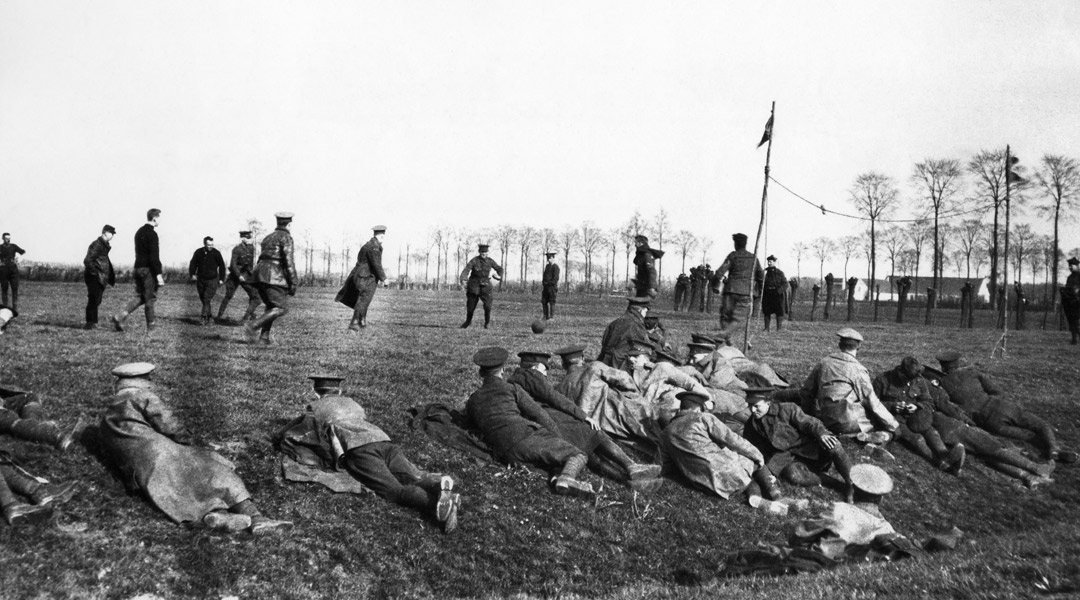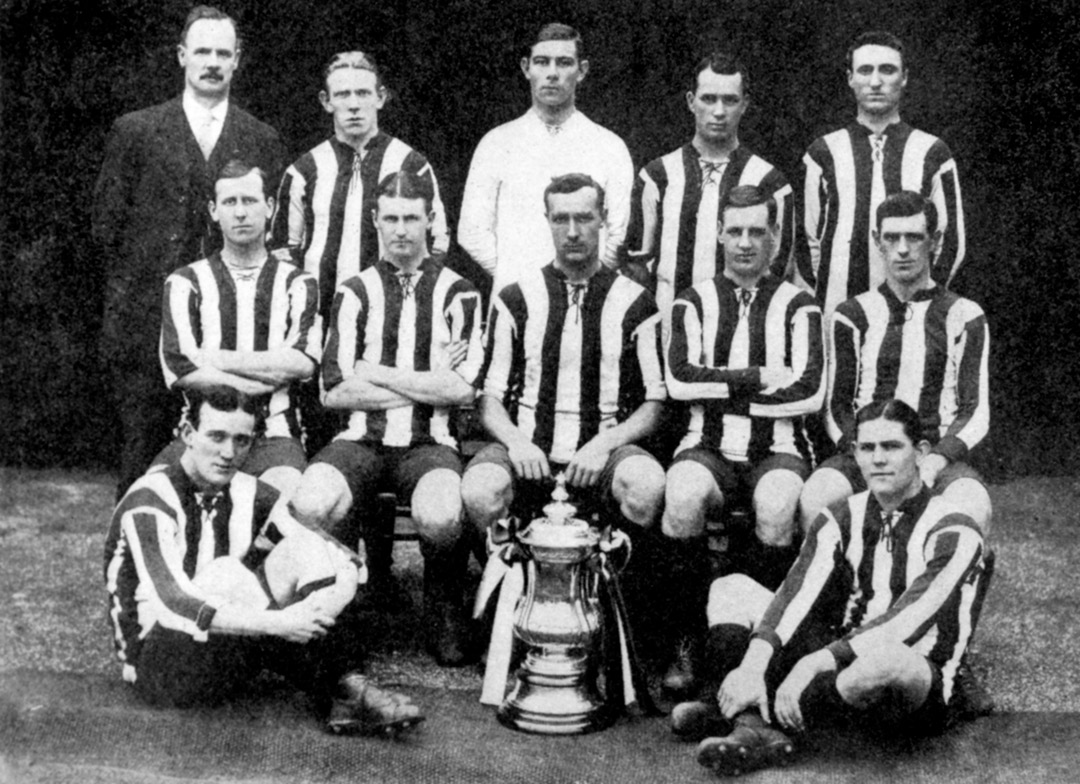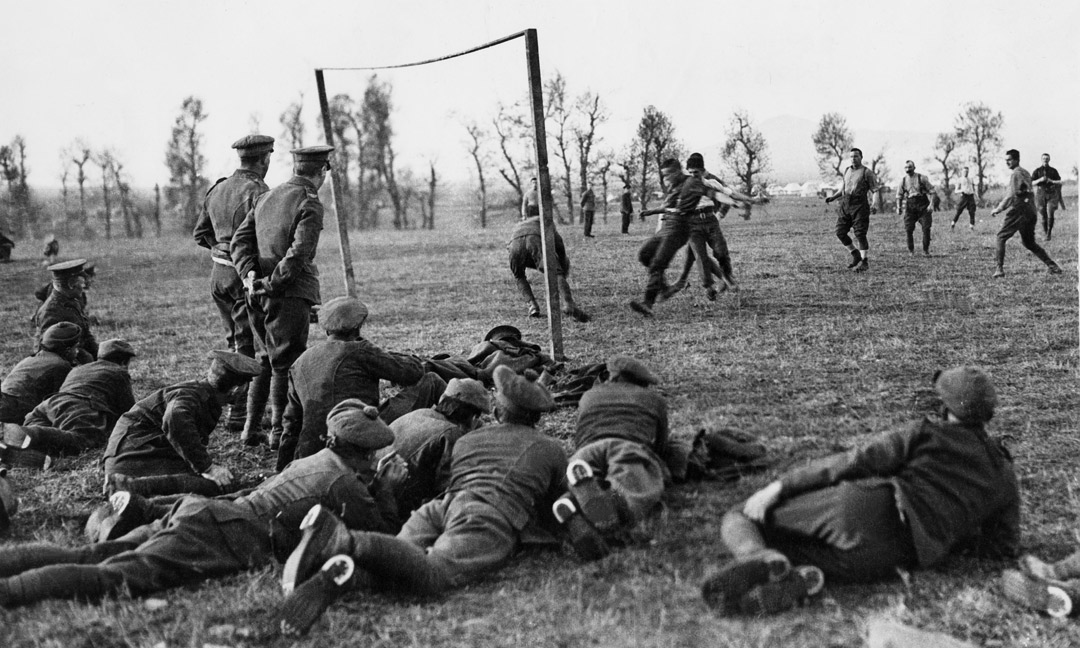The Great War, 100 years on: when football defied Kitchener – and angered a nation
While Britain's men were sent to the Front in their thousands in 1914, its footballers weren't quite so keen to sign up for the war effort. Unsurprisingly their unwillingness was deeply unpopular, as Richard Edwards reflects...

In summer 1914, it wouldn’t have taken a super sleuth to detect that the public’s appetite for sport had been well and truly usurped by a desire to give the Germans a thorough hiding on the battlefield.
The creator of the world’s most famous fictional detective captured the mood perfectly on the eve of the football season 100 years ago. “There was a time for all things in the world,” said full-time Sherlock Holmes author and part-time goalkeeper, Arthur Conan Doyle. “There was a time for games, there was a time for business, and there was a time for domestic life. There was a time for everything, but there is only time for one thing now, and that thing is war.
“If the cricketer had a straight eye, let him look along the barrel of a rifle. If a footballer had strength of limb, let them serve and march in the field of battle.”
The problem was that the sport itself wasn’t overly keen on letting its prized assets join a fight that some had optimistically predicted would be over by Christmas of the same year anyway.
Get FourFourTwo Newsletter
The best features, fun and footballing quizzes, straight to your inbox every week.
Chelsea, for example, summed up the mood of the football fraternity just days after the first shots were fired in anger: “The directors of the Chelsea Football Club have decided that football will be played as far as possible, and subject to the approval of the Football Association, all the money taken for charity matches will be handed over to the Prince of Wales’ fund, and also a percentage of the takings from the time when the season starts until the end of the war,” reported The Times three days after war was declared.
Under pressure
Back then, of course, no one could have predicted the unprecedented bloodshed that was about to follow. But despite the club’s offer of cash, what Lord Kitchener – the man charged with leading the war effort from Whitehall – really needed wasn’t money, but men. It didn’t take long for him to realise that the country’s footballers were the kind of poster boys that this campaign was crying out for.
There was certainly no shortage of people prepared to jump on his bandwagon as the football season kicked off on September 1.
West Ham, then of the Southern League, began their season with a home match against Gillingham, but it wasn’t simply the men of Kent they were clashing against – it was popular opinion.

With the death toll across the Channel already mounting, and each passing day making predictions of a Christmas conclusion look hopeful at best and downright fanciful at worst, the head of the Tower Hamlets Mission, Frederick Charrington, took to the stage and delivered an outspoken Sam Allardyce-like summation of the situation.
The Hammers’ players were, he said, “effeminate” and “cowardly” for playing football while others were putting their life on the line in the Western Front. Even the country’s most outrageously talented sportsman, the incomparable C.B. Fry, threw his weight behind the call to bring League football to a temporary halt.
Contracts should, he told reporters, “be annulled”. He also believed that “no one below 40 years of age should be allowed to attend matches”.
Perhaps the biggest boot in English football’s bread basket, though, came from the influential Bishop of Chelmsford. Speaking in Bethnal Green, he told the gathered congregation that footballers were as important to the war effort as the young men who had already signed up to fight across the Channel.
“The Bishop, in an address of duty, spoke of the magnificent response that had been made to the call to duty from the King,” reported the Stratford Express. “All must play their part. He felt that the cry against professional football at the present time was right.”
Reluctance
History would prove that the footballers of this country were as ready to sign up as the man in the street – with the enormous losses of the so-called ‘Pals regiments’ providing a humbling sporting backdrop to a four-year canvas of almost unrelenting human misery – but the newspaper archives of the time show that the War Office, as well as the Football Association and the clubs themselves, was reticent about pulling a reassuring comfort blanket away from a country not yet worn down by battle.
“At a meeting of the Consultative Committee of the Football Association in London yesterday, it was stated that the War Office opinion was favourable to the continuance of football,” The Times reported on the opening day of the 1914/15 season. “The Football League has recommended each club to arrange for their players to undergo special military drills, and for the provision of a miniature rifle range to provide ample shooting practice.”
That wasn’t enough for some, though, with even the media calling for football to cease. With the war just over a month old, the Evening News announced that its Saturday evening football edition would not be printed while the war was ongoing. “This is no time for football editions,” the paper stated. “This is no time for football. This nation, this Empire, has got to occupy itself with more serious business.”

As the death tolled continued to rise, clubs made further efforts to appease by announcing that their grounds were at the disposal of the War Office on days other than match ones “for use as drill grounds or as the Service may require”.
Arrangements were also made for well-known high-ranking local officials to address both crowds and players before and after matches to enlist immediately. The FA, meanwhile, called on clubs to release professional footballers who were not married. Not all media mouth pieces, however, were convinced.
“What do they [the War Office] care for the poor man’s sport?” fumed the Athletic News. “In many cases they have nothing else... They should, according to a small clique of virulent snobs, be deprived of the one distraction that they have had for over 30 years.”
Before Scudamore
In an unlikely and scarcely believable parallel of the 39th game debate, almost 95 years later, the Daily Express carried a report that some were in favour of the 'principal League fixtures' of Christmas matches being played near the troops' base in northern France. “This would give men rest and on their way to the front some splendid entertainment, and would also let the men in the trenches receive the results almost at once,” it wrote.
But while the professional game took an understandable hammering for their intransigence, one unnamed Football League director outlined a prosaic case for the sport's continuation. “Like the majority of League clubs it [the director’s club] is heavily in debt,” he wrote in a letter to The Times. “The great difficulty facing its directors is that although the club is a limited liability company, its assets are of such a nature that they have had to pledge their personal credit at their bank for an overdraft of thousands. The only asset against this is the transfer values of the players.”
Contained within his letter lay the very crux of football’s reluctance to let its star names join the humble Tommie in the trenches, and although the sport would eventually and inevitably stand in line – ultimately surrendering some of its most gifted players to the perils of warfare – that note encapsulates the dilemma that the clubs faced all those years ago.
So as we reflect on the war that changed the world forever a century ago, and remember those who lost their lives throughout that brutal period, it's worth taking a moment to consider the real reason that the season of 1914/15 is still a matter of public record. Perhaps we could also conclude that in the century that has followed, the sport hasn't really changed too much at all.
